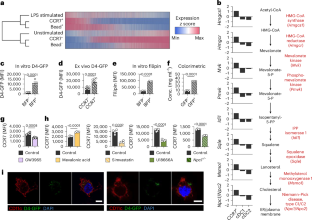胆固醇动员调节树突状细胞成熟和对癌症的免疫原性反应
IF 27.7
1区 医学
Q1 IMMUNOLOGY
引用次数: 0
摘要
传统树突状细胞(cdc)的成熟对于维持对自身免疫的耐受性保护和促进对病原体和癌症的免疫原性反应至关重要。cDC成熟的亚细胞机制仍然不清楚。我们发现,cdc通过利用内部胆固醇储存库(利用细胞外细胞碎片并由从头合成产生)在成熟cdc的细胞表面组装脂质纳米结构域,增强成熟标记物的表达并稳定免疫受体信号传导,从而成熟。这一过程依赖于胆固醇通过Niemann-Pick病C1型(NPC1)转运,并介导稳态和toll样受体(TLR)诱导的成熟。重要的是,我们发现受体酪氨酸激酶AXL是npc1依赖性脂质纳米结构域构建的调节剂。从cdc中删除AXL可以促进其成熟,从而提高抗肿瘤免疫能力。总之,我们的研究提出了胆固醇动员作为cDC成熟的基础的新见解,并强调了AXL作为调节cDC的治疗靶点。本文章由计算机程序翻译,如有差异,请以英文原文为准。


Cholesterol mobilization regulates dendritic cell maturation and the immunogenic response to cancer
Maturation of conventional dendritic cells (cDCs) is crucial for maintaining tolerogenic safeguards against auto-immunity and for promoting immunogenic responses to pathogens and cancer. The subcellular mechanism for cDC maturation remains poorly defined. We show that cDCs mature by leveraging an internal reservoir of cholesterol (harnessed from extracellular cell debris and generated by de novo synthesis) to assemble lipid nanodomains on cell surfaces of maturing cDCs, enhance expression of maturation markers and stabilize immune receptor signaling. This process is dependent on cholesterol transport through Niemann–Pick disease type C1 (NPC1) and mediates homeostatic and Toll-like receptor (TLR)-induced maturation. Importantly, we identified the receptor tyrosine kinase AXL as a regulator of the NPC1-dependent construction of lipid nanodomains. Deleting AXL from cDCs enhances their maturation, thus improving anti-tumor immunity. Altogether, our study presents new insights into cholesterol mobilization as a fundamental basis for cDC maturation and highlights AXL as a therapeutic target for modulating cDCs. To mature, dendritic cells collect and synthesize cholesterol to construct lipid nanodomains on their membranes. Obstructing this process impairs their ability to prime T cells.
求助全文
通过发布文献求助,成功后即可免费获取论文全文。
去求助
来源期刊

Nature Immunology
医学-免疫学
CiteScore
40.00
自引率
2.30%
发文量
248
审稿时长
4-8 weeks
期刊介绍:
Nature Immunology is a monthly journal that publishes the highest quality research in all areas of immunology. The editorial decisions are made by a team of full-time professional editors. The journal prioritizes work that provides translational and/or fundamental insight into the workings of the immune system. It covers a wide range of topics including innate immunity and inflammation, development, immune receptors, signaling and apoptosis, antigen presentation, gene regulation and recombination, cellular and systemic immunity, vaccines, immune tolerance, autoimmunity, tumor immunology, and microbial immunopathology. In addition to publishing significant original research, Nature Immunology also includes comments, News and Views, research highlights, matters arising from readers, and reviews of the literature. The journal serves as a major conduit of top-quality information for the immunology community.
 求助内容:
求助内容: 应助结果提醒方式:
应助结果提醒方式:


